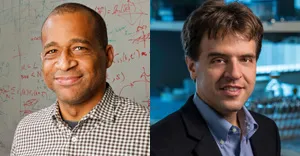
Inside Stanford Medicine - May 9, 2013 - by Rina Shaikh-Lesko
Two Stanford researchers are among 27 scientists appointed today by the Howard Hughes Medical Institute as investigators. They were chosen through a competitive selection process from a pool of more than 1,000 candidates.
The new investigators are Tirin Moore, PhD, associate professor of neurobiology, and Karl Deisseroth, MD, PhD, professor of psychiatry and behavioral sciences and of bioengineering. Both Moore and Deisseroth received HHMI Early Career Scientist appointments in 2009.
"We've taken some high risk approaches, and sought to develop technologies that seemed to have a low expected probability of success," said Deisseroth.
HHMI will provide both researchers with flexible support for their research over a five-year renewable appointment, including full salary and benefits, a research budget as well as payment for research space and critical equipment. The organization supports creative, innovative approaches to medical research by employing researchers, rather than simply providing grants for specific research projects. Researchers are able to take risks or change research directions if necessary.
"We at Stanford Medicine are grateful to the Howard Hughes Medical Institute for their support and for sharing our commitment to highly creative scientists and paradigm-changing science," said Lloyd Minor, MD, dean of the School of Medicine. "We are proud of the accomplishments of Dr. Deisseroth and Dr. Moore, and look forward to even greater achievements."
With today's appointments, Stanford University now has 20 HHMI investigators, 17 of whom are faculty of the medical school. (Deisseroth is part of the Department of Bioengineering, which is jointly operated by the School of Medicine and the School of Engineering.)
Moore's research focuses on understanding how neural circuits control visual attention, or the ability to filter out unimportant and distracting stimuli and to focus on what's important. He noted that this capacity is compromised in people with conditions like attention deficit hyperactivity disorder.
His HHMI Early Career Scientist funding helped him answer key questions about which structures are involved in these processes. "As is always the case, every time you discover something, you discover new questions," he said. "This funding expands our capacity to pick apart that neural circuit. It's fantastic."
Deisseroth's laboratory recently developed a technique called CLARITY, supported in part by his HHMI Early Career Scientist funding, that can convert biological systems (such as entire, intact mammalian brains) into a fully transparent form. This technology allows researchers to track neural pathways across the brain, and identify the molecular composition of these pathways within the intact brain. It's a process that could revolutionize how neuroscientists study the brain. Beginning in 2004, Deisseroth also developed optogenetics, an equally revolutionary technique that allows scientists to control individual types of neurons in living animals. That technique is now used by thousands of neuroscientists.
"We've taken some high risk approaches, and sought to develop technologies that seemed to have a low expected probability of success," said Deisseroth, who also holds the D.H. Chen Professorship. "Both optogenetics and CLARITY, because they were such high-risk projects, underscore the importance of the kind of support HHMI provides."
His next steps will be to use optogenetics and CLARITY together, as well as to develop new technologies to study neural activity and behavior together both in normal conditions and in the setting of psychiatric symptoms.
Both Deisseroth and Moore noted that HHMI's support freed them to undertake more audacious projects. "HHMI supports people who are willing to take substantial risks; since the possible benefits are so substantial, that's why this kind of support is important for the community," said Deisseroth.


